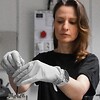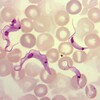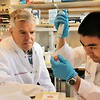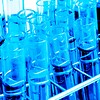Fritextsökning
Artiklar per år
Innehållstyper
-

Column: ”Cheating with pea flowers and does it matter whether you are right?”
Is it possible to forgive shortcuts or outright cheating in science - if it turns out that the researcher was ultimately right? Anna Törner discuss this topic in a column.
-

AI baserad på språkalgoritm skapade nya fungerande proteiner
Inte ens proteiner går säkra för språkrobotarna. I det senaste numret av Nature Biotechnology presenterades språkmodellen Progen som, enligt forskarna bakom studien, lärt sig semantiken och grammatiken i proteinernas språk.
-

Individual DNA passport could result in fewer drug side effects
You may be required to show a DNA passport when you pick up medicines at the pharmacy in the future. According to a new study, patients might suffer 30% fewer side effects if the drug treatment is adapted to their genes.
-

Snabbväxare under pandemin – nu tvingas diagnostikbolaget skära ned
Det minskade behovet av testning efter pandemin slår hårt mot diagnostikbolaget Dynamic Code, som nu aviserar ett sparpaket. Ett 20-tal medarbetare berörs, och samtidigt pausas företagets satsning i Tyskland.
-

Great Swedish innovations: Eye treatment became a feather in Pharmacia’s cap
From complicated and sometimes risky surgery to a routine procedure. Pharmacia’s injectable Healon revolutionised the field of eye surgery - and is considered by us one of the most important contemporary Swedish innovations in the field of medicine.
-

Dynamic Codes vd slutar
Diagnostikföretaget Dynamic Codes vd Louise Nylén har beslutat sig för att lämna sin post.
-

“We aim to be a start-up company with an academic spirit”
Chronic pain and Alzheimer’s are two diseases that plague many people worldwide and seem impossible to cure. However, Huddinge-based company Alzecure is working on developing drugs for both conditions.
-

Biosimilars bring price pressure, but are they sufficiently used?
When biosimilars were introduced just over 16 years ago, hopes were raised that they would give many more patients access to effective but otherwise extremely expensive treatments with biological drugs. So, how well has Swedish healthcare used biosimilars? The answer partly depends on whom you ask.
-

Amorphous materials take centre stage when Orexo develops new formulations
Swift resolution but with maintained stability. Orexo’s new drug delivery platform tackles the problem of amorphous materials. “Our technology has the positive properties of the material, and it also cracks some of the problems,” says the company’s Research and Development Manager Robert Rönn.
-

Ny metod för mikroskopi öppnar genväg till nya läkemedel
Forskare vid Chalmers har utvecklat en helt ny mikroskopiteknik för att kunna studera de minsta biologiska partiklarna i sitt naturliga tillstånd – och därmed öppna vägar för snabbare utveckling av nya läkemedel och vaccin.
-

A growing industry in Denmark: “One new life science company a week”
The life science sector in eastern Denmark continues to grow in the number of employees, as well as the number of companies. An emerging problem is the shortage of labour, a new report reveals.
-

Anna Törner: To kill your darlings
Hopes were high when Anna Törner and her colleague started a study on a dietary supplement that seemed unbelievably good. “Enthusiastically, we dreamed of exciting results and perhaps a publication in a high-impact journal,” she writes in a column.
-

Hello Angelica Loskog!
Life Science Sweden would like to know more about Angelica Loskog and interviews her about her life as a researcher.
-

Noxious parasite forms hybrids and deceives the immune system
The small parasite Trypanosoma cruzi has a nasty ability to cause serious illness. Researchers at the Karolinska Institutet have now mapped its ability to deceive the immune system by forming new variants that are mixtures of different strains.
-

Investments worth 40 billion in the Öresund region – “A huge investment wave”
A new report reveals that medical companies in the Oresund region are investing like never before.
-

We will now publish more news in English – and offer yet another newsletter
Starting next week, Life Science Sweden will begin offering a newsletter entirely in English.
-

Miljonstöd till 14 life science-projekt för bättre hälsa
Nya tekniker för fixering av handfrakturer, AI-prediktion av blodtrycksfall och tidig detektion av bukspottkörtelcancer finns bland de 14 projekt för bättre hälsa som får miljonstöd av innovationsprogrammen Swelife och Medtech4health.
-

Elicera develops CAR-T against solid tumours – may become the first in the world
Today, there are five EU-approved CAR-T therapies, all focused on different types of blood cancer, but no one has yet succeeded in making the method work against solid tumours. At Gothenburg-based Elicera, they are working relentlessly to succeed in that field as well. “It is the largest field, and the potential is enormous,” says the company’s CEO Jamal El-Mosleh.
-

CAR-T therapies give continued hope: “Almost half of the patients have become disease-free”
become disease-free, at least of those treated with Yescarta, which are the ones I know best,” says Gunilla Enblad, Chairman of the national working group for CAR-T treatment.
-

Björn Arvidsson: ”We need to change perspective”
If you say “life science” to a person on the street and ask them to explain what it is, you will probably get no good answer. The same question to your network will generate as many versions as the people you ask. Most likely, we will miss many
-

Aegirbio utser ny vd
Det problemtyngda diagnostikbolaget Aegirbio har utsett Bradley Messmer till ny vd.
-

Aegirbio bryter med Nowmed
Diagnostikförtaget Aegirbio avslutar sitt avtal med distributören Nowmed.
-

Problemen hopar sig för Aegirbio
-

Aegirbios vd sjukskriven
Aegirbios vd Martin Linde är sjukskriven tillsvidare. Istället tar Patrik Elfwing över som tillförordnad vd.